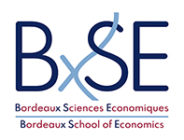Agenda > Tous les événements
Séminaire d’économie de Bordeaux
Abel François
(EM Strasbourg Business School, Université de Strasbourg)
Sophie Panel
(Sciences Po Grenoble, Université Grenoble Alpes, CESICE)
International aid is sensitive to dictators’ facial competence!
Abstract: Previous research shows that aid donors react to the quality of governance in recipient countries: they tend to avoid countries with poor institutions, where aid is more likely to be misused. In non-democratic countries, however, successful aid implementation depends not only on the quality of institutions but also on the characteristics of political leaders. In this paper, we test the hypothesis that donors rely in part on the impressions conveyed by dictators’ faces to assess their propensity to divert or otherwise misuse foreign aid. In particular, we test whether non-democratic countries receive more aid when they are ruled by a dictator who looks either competent or trustworthy. We analyse the relationship between facial impressions and foreign aid on a sample of about 100 non-democratic countries observed over the period 1975-2010. Impressions of competence and trustworthiness were collected using a computer-based survey in which we asked anonymous respondents to rate pictures of 274 non-democratic leaders on competence and trustworthiness. We draw three main conclusions. First, competent looking dictators attract more foreign aid, but we do not find a similar relationship between aid and perceived trustworthiness. Second, the relationship between facial impressions and aid is stronger for general budget support than for targeted aid, and for cash aid than for aid in kind: these patterns suggest that donors attach more importance to the competence of the recipient when aid is easier to divert. Third, two-part models suggest that the probability of receiving aid, but not the amount of aid received, is sensitive to dictators’ facial competence.
>> pour assister au séminaire via Zoom, contacter julie.vissaguet@u-bordeaux.fr



